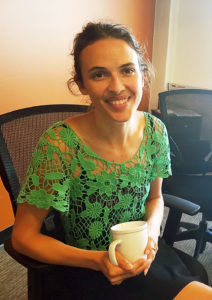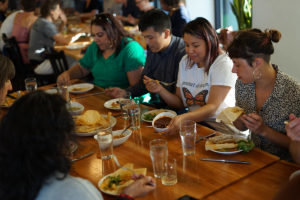By JAN WILLMS
Seward Co-op first opened its doors in 1972, and along with the community it has grown and diversified over the years. Starting at 22nd and Franklin, the store expanded and moved to 2108 Franklin Ave. in 1998. An additional need for expansion brought it to its present location at 2823 Franklin Ave in 2009.
 “But after a few years even with this space, we needed more room and we're getting complaints about parking,” said Abby Rogosheske (photo right by Jan Willms), education and outreach coordinator for Seward Co-op. “We felt the need to open a second store at 317 E. 38th St., the Friendship Store. That store opened in 2015.”
“But after a few years even with this space, we needed more room and we're getting complaints about parking,” said Abby Rogosheske (photo right by Jan Willms), education and outreach coordinator for Seward Co-op. “We felt the need to open a second store at 317 E. 38th St., the Friendship Store. That store opened in 2015.”
At the same time, the co-op owners realized a central production facility was needed for the stores. That facility opened in 2015 in a former creamery building at 2601 E. Franklin. Downstairs is the production facility where all deli items, bakery items, and sausage are made for both stores. Upstairs houses the administrative offices. And because of zoning requirements, a storefront was needed, and so the Creamery Café was born.
“We thought also having a café was a good thing,” Rogosheske said. “Our manager, Sean, talks about a three-space concept: home, work, and community.” The café, as well as the stores, provides for a community gathering place.
Having the additional room has allowed the co-op to pursue several programs for the community. One of these is the seed program, which refers to a grant that the co-op can run. “The concept is that each of us plants a little seed,” Rogosheske said. The idea began with the opening of the co-op on 28th and Franklin. “It started as part of a March food drive,” Rogosheske explained. “All the co-ops have a friendly competition to see how much money and food we can raise. We ask customers to round up to the nearest dollar on a purchase. And that additional money goes for a food shelf.”
She said the drive was such a success that the cashiers said Seward Co-op should do this every month. “It was an entirely staff-led initiative,” Rogosheske continued. “So at that point, a committee was formed, and we as a staff choose one of the recipient organizations every month to receive the round-up. I facilitate the process, but specifically, the cashiers at the two stores and front of the house at the café are the ones who do this. They do the work, asking customers if they want to round up and if they want to hear about the organization.”
Rogosheske said it is a very competitive process. “We had a hundred applicants this year,” she said. The average donation comes to about 40 cents, but the money raised from the two stores and café is considerable. The August check for that month’s selected organization, Mad Dads, was $23,000.
“We can raise over $20,000 every month,” Rogosheske said. “To me, that is the power of a cooperative community right there, when each gives about 40 cents but all come together as support within our community.”
Rogosheske said each applicant writes a two-page application essay. “I put it into a giant binder,” she said, “along with other supplementary materials. The committee then reads through everything.”
The applications are on the Seward Co-op website in mid to late May, with a submission deadline of June 30. The selection process is worked on throughout the summer.
The process has been switched up a bit this year, according to Rogosheske. “It’s such a popular program; we wanted to provide more opportunity for the community to participate besides just rounding up. So this year we tried an experiment.”
The staff committee selected eight recipients out of the 12. Ten other finalists were selected, for a total of 18. “Those ten get smaller grants from Seward Community Fund,” Rogosheske explained. “A Community Choice vote for those ten was launched Sept. 19. Anyone can vote for the top four choices from that list. An organization can get its name out there, and there will be a new level of engagement from the community.”
She said the selections are pretty much narrowed to the Twin Cities. The choices for organizations reflect the communities served and ownerships that reflect diversity are a priority. Although the vast majority of organizations that are awarded monthly are nonprofits, some for-profit farm organizations have been selected in the past.
The September winner of the seed program was Capi, a food shelf that is specific to Asian immigrants. The October selection is the Hmong American Farmers Association (HAFA).
Rogosheske said finalists in the Community Choice vote would be announced by late September, with the final winners announced at the Seward Co-op annual meeting Oct. 30. “We recognize the selections at the meeting, and people get applauded,” she said.
 Photo left: Tamales y Bicicletas was the Farm Table program in July 2018. (Photo provided)
Photo left: Tamales y Bicicletas was the Farm Table program in July 2018. (Photo provided)
At the beginning of each month, representatives from the selected organization come into the Co-op and train the cashiers so they can talk about the organization when asking customers to round up. That same month, according to Rogosheske, the organization has representatives tabling at the stores and interacting with customers, so they are confident about where their money is going.
“At the end of the month, we do a check ceremony, have some treats and hand over the check,” Rogosheske said. “Whatever amount people have rounded up to is given to the organization, with no percentage taken out by the Co-op.”
She said other co-ops are doing similar programs, but Seward could be considered a national model for the process. “We get a lot of phone calls asking how we run our program,” she said.
Another innovation Seward has started is the Farm Table dinner, held once per quarter. “We try to align with seed recipients, and the meal is sourced partially from their food. The meal is held in our café, created by our executive chef and sourced from the seed recipient. Our next one is coming up Oct. 23, a three-course dinner that will raise awareness about that month’s seed recipient, HAFA.”
Seward Co-op also supports other co-op programs, such as Village Financial Cooperative, that is specifically African-American led. “There is a perception of food co-ops started by white hippies in the 1970s in white spaces, but there is a long history of co-op development in African American communities,” she said. “We have conversations about how do we support a more cooperative economy in general,” she added.
Some classes, some free and some for a fee that is discounted to members, are held at the Seward Co-op on a regular basis.
Classes include cooking with bulk greens, fermenting your own pickles, supply chain sustainability, soap making, and Japanese cooking.
Reflecting on her job with the Co-op, Rogosheske said she feels so proud of the seed program, the Farm Table dinners, and classes. She said Seward Co-op now has the physical space and staff to be able to offer a variety of services to the community.
She feels passionate about her job. “I love it. I have a passion for food justice and sustainability and working for justice on many levels. So whatever role the Co-op can play, I want to be part of connecting the Co-op into however we can plug in to social justice.”
Comments
No comments on this item Please log in to comment by clicking here